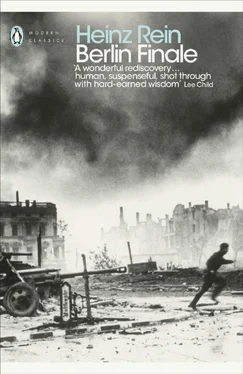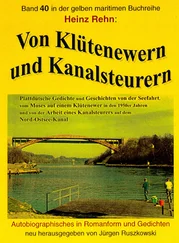Even if the big depot was not brought to a standstill, since there were enough fallback procedures in place, considerable disruption still occurred.
The perpetrator, who must also have had access to the central locomotive control room, had preferred to render unusable precisely those trains intended to bring supplies to the eastern front.
Now Deiters is waiting for the results of the SD investigations, after further pursuance of the matter was taken out of his hands early in February. ‘I called you here today, Mr Deiters,’ Wellenhöfer begins the conversation, ‘to tell you that we are almost certain that we have identified the perpetrator.’
Deiters sits bolt upright.
‘Really?’ he says, almost breathless. ‘Congratulations!’
‘Thank you,’ Wellenhöfer says carelessly, looks at him with cool contempt and lights a cigarette.
‘So who is it, if I may ask?’ Deiters asks. ‘You must tell me, after all, so that I can take my own measures.’
Wellenhöfer blows the smoke from his cigarette playfully in front of him. ‘You have absolutely no measures to take, Mr Deiters,’ he says in a cold and cutting voice. ‘You will do what I tell you to do, no more and no less.’
‘Of course,’ Deiters says and smiles awkwardly, ‘I was just saying.’
‘Your opinion is absolutely undesirable to me, and of no interest whatsoever,’ the Sturmbannführer continues in the same tone. ‘I have called you here today, not to hear your unimportant opinions, but to give you orders and precise instructions.’
Deiters shrinks under his sharp, aggressive tone. ‘Of course,’ he says quietly. ‘May I be permitted one question, Mr Sturmbannführer?’
‘You may,’ Wellenhöfer replies contemptuously. ‘And I will draw your attention once again to the fact that Mr Sturmbannführer does not exist as a form of address. It always amazes me that as a Party member you are not more familiar with the customs of the SS. So what do you want to know?’
‘Has the perpetrator already been arrested?’ Deiters asks now.
‘Arrested?’ Wellenhöfer asks back. ‘I fear that you have lost your mind!’
‘I… I don’t understand, you said…’ Deiters stammers.
‘I am well aware that you understand nothing,’ Wellenhöfer continues. ‘Arrested! Had he been arrested straight away, the proverbial bull would have entered the china shop. No, my dear fellow, you don’t arrest a chap like your perpetrator, you let him run around freely for a while and observe him, because a customer like this always has an entourage. We will go in for the attack when we have the whole gang, not before.’
‘But until that happens,’ Deiters summons the courage to object, ‘he can do all kinds of damage.’
‘Do you take me for an idiot?’ the Sturmbannführer roars, lowering his head like a bull and placing both hands firmly on the desk. ‘Of course the man needs to leave the depot, he must be transferred to a position where he can’t stir and agitate and do damage, where he is under constant supervision. That’s why I summoned you here today, to…’
The phone rings and Wellenhöfer picks up the receiver. ‘Siering is here? Tell him to come straight to me.’
He hangs up and turns again to Deiters. ‘Untersturmführer Siering is the man who brought the matter to its temporarily successful conclusion. You will hear very shortly.’
Some minutes pass, Wellenhöfer appreciatively smokes a cigarette down to the butt, Deiters leans back in his chair, stares blankly in front of him, when there is a knock he gives a start.
A young man is standing at the door.
‘Heil Hitler! Untersturmführer Siering reporting for duty!’
Wellenhöfer returns the greeting and points to the chair. ‘This is Senior Inspector Deiters from the Karlhorst depot,’ he says, casually waving in Deiters’ general direction.
Siering nods to him cursorily and sits down.
‘My suspicion has become a hundred-per-cent certainty, Sturmbannführer,’ he says.
‘Good, Siering!’ Wellenhöfer nods with satisfaction. ‘Thank you, after definitive and successful completion of the investigations I will put you forward for promotion.’
‘I am honoured,’ Siering says.
Wellenhöfer waves his words away. ‘It’s fine,’ he says. ‘But now I would like to hear once again a complete report on the results of your work.’
‘In the presence of this gentleman?’ Siering asks, nodding towards Deiters.
‘It doesn’t matter,’ Wellenhöfer replies, ‘we need to bring him into our confidence anyway, and your report will give him a rough idea of how we are supposed to work in such cases. So fire away.’
Siering leans back and folds his arms over his chest. ‘The first thing to do was to mark out the circle of suspects, and draw that circle tighter and tighter,’ he begins. ‘At first I established the times when the different acts of sabotage were committed, and that produced a certain result: all acts of sabotage were performed in the shift from ten in the morning until six in the evening. Only manual workers, clerks and officials who worked during that period were taken into consideration, and with the exception of some office workers who only work by day, that was all of them.’
‘So not all of them, in fact,’ Deiters suggests, ‘I’m sure you won’t have suspected the executive staff.’
Siering swings round and looks at Deiters as if noticing his presence for the first time.
‘Why not?’ he asks. ‘Fundamentally everyone is a suspect, even you, Senior Inspector.’
‘But please…’ Deiters says defensively.
‘Don’t interrupt me,’ Siering says roughly, ‘I don’t want to talk to you about my working method, and I need only refer you to the twentieth of July.’ He turns his back on Deiters again, and addresses the Sturmbannführer. ‘So I shall continue. The dates of the acts of sabotage already considerably reduced this great circle of suspects, because the dates yielded the following: the acts of sabotage were only carried out at night, and at very regular intervals of about three weeks, that is, they accumulated in one week, then there was a pause of fourteen days in which everything continued in an orderly fashion, and then they began again, stopping after a week, again for fourteen days. It could not be a coincidence. The solution to the apparent mystery presented itself to me when I got hold of the duty rosters of the Karlhorst depot. The circle in which the perpetrator was to be sought became considerably smaller, by precisely two-thirds.’
‘Excellent!’ Deiters cannot help interjecting.
‘Yes, excellent,’ Wellenhöfer says sarcastically. ‘It never occurred to you, you dyed-in-the-wool expert. Continue, Siering.’
‘I had a fixed circle of people that I now had to deal with,’ Siering goes on. The foreigners were ruled out, as the perpetrator, on the occasion when he had almost been caught, was said to have cursed in fluent German. I must say quite openly that this information did not seem to me to be nearly as valuable as the Senior Inspector likes to claim. What convinced me much more firmly that the perpetrator is a German was the thorough, systematic nature of his work, a quality which I would hesitate to attribute to the Belgians, Dutchmen, Serbs, Italians and whoever else is swarming around in the depot. If the circle of suspects had also become considerably smaller, it was still a large number of people, forty-seven in all. An unremarkable confrontation between the train driver who had scuffled with the saboteur and these forty-seven people led to nothing. Further investigation and detailed interrogations removed several more people from consideration. I might mention here only the two workers involved in de-clinkering the locomotives, who were kept busy all night and were able to keep an eye on one another, and the stoker who fills the stoves in the boiler room, the train driver and the stoker of the Teckel, the depot locomotive, who also keep checks on each other, and I also dismissed from the circle of suspects a number of officials who had already retired but volunteered themselves, and some doubtless dependable Party members. Through the application of this deductive method the number of suspects had dropped to eighteen, but after that it remained constant. So I had no other option but to subject these eighteen people to precise investigation. I looked into their domestic circumstances, I talked to their neighbours and concierges, and even made myself directly known to them. So suspicion was in the end narrowed down to a few people, but suspicion is not proof, and if I had simply issued a warrant against the six people whom I considered to be likely suspects, perhaps the actual perpetrator would have been among them, but we would not have tracked down the rest of the gang to which he doubtless belonged. I will not trouble you, Sturmbannführer, by listing every individual clue relating to one individual or another, I shall only say that those six people were all loners who had no family and came from elsewhere, some of them from territories currently inaccessible to us. The police registration cards were entirely blank and offered no clues, except that I was struck by the fact that one of them had moved house unusually often. To avoid being over-hasty and drawing false conclusions, I investigated all seven of his previous addresses and discovered that his frequent change of residence did not occur because he had been bombed out, for example, as one might have assumed, and neither was he dismissed by his landlord in six of those cases, but he gave up the room voluntarily. He always gave a good impression, he was described as a quiet man who kept himself to himself, who never received visits of any kind, and people were extremely surprised when he gave up his room one day for no reason. A few days’ observation produced no results, and the regular evening air-raid warnings kept thwarting my plans. I’m not mentioning the elements of suspicion against the other five people, I just wish to show how and why I… happened upon this particular person.
Читать дальше












